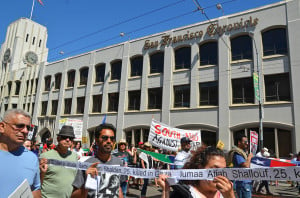
Photo: Gloria La Riva
“I won’t do what you tell me,” is a sentiment that can seem radical and anti-system when aimed against the social/political/economic structures that oppress us under capitalism. In a society where the values of individualism, authoritarianism, complacency, division, exploitation and hierarchy are instilled in us at young age, it is radical, and at times revolutionary, to “swim against the current.”
But, what if, we stand up against ALL authority, without a clue as to the class nature of that supposed “authority?” What if, we stand up against ALL structures of organization because they perpetuate “authority” over us? What if we act each with our own messages, our own tactics based on the moment and impulse? If I would be drawn to such a view of political thought and tactics, then there is no “we.” There is “I,” and “I” would be practicing petty individualism.
Practicing petty individualism can be characterized in the following ways:
– Taking over the front of a march, usurping an action’s message and tactics while claiming to reject “authority.”
– Verbal and physical hostility towards anyone who facilitates or directs an action.
– Anti-social anonymity where no name or contact is given. These same masked individuals ironically claim to not “trust” those who show their faces to the public they organize with.
– Accusing march organizers and facilitators of being “pigs,” a completely degenerated view of state oppression.
– Complete lack of self-awareness or self-criticism resulting in no consideration of privilege, difference, and accessibility.
– Antagonizing cops and other state forces, the consequences of which these “radicals” are not prepared to deal with, resulting in organizers and facilitators having to deal with the bruises, beatings and arrests.
I want to distinguish the collective nature of anarchist/autonomous traditions and communist/socialist/centralized traditions from the self-centered nature of those who practice petty individualism. Young people are taking to the streets. Their militant energy, which seeks to end capitalist oppression immediately, revitalizes the movement. We all seek to incorporate them into our traditions in order to carry out our own methods for revolution. Street actions, direct and civil disobedience actions, forums, gatherings, marches and rallies are all tactics, in which we want to involve this new layer of fighters.
However, there are those who inexcusably reject, dismiss and even disrespect our collective traditions by looking to self-indulge in the power of people in motion. Petty individualism is not a political approach compatible with the collective efforts behind anarchist/autonomous or more centralized groupings.
Leninism, Anarchism or What?
A recent article on Telesur-English caught my attention. Titled “Leninism, Anarchism or What?” by Michael Albert, it is an engaging piece which raises the question, “Can Lenny [a Leninist] and Ana [an anarchist]- and others – recognize the need for arriving at a patient and at least a somewhat new set of behaviors and practices, including jettisoning some past views they have championed?” It is a very timely question to raise.
In the post-Occupy period, where dozens of large marches have emerged throughout the country in support of Palestine, the movement knows that there is enough pent up anger just waiting to emerge onto the streets. And the inevitable question to organically emerge will be “what tactic to use?” This is a question that cannot be dealt with “organically.” It is also a question that cannot begin to be addressed by those who practice petty individualism and act on behalf of “I.”
“We” who are in the streets and have established a relationship; “we” who have an understanding of each others’ traditions and practices, “we” need to be open to collaborating around various political issues. The state is winning the fight in every front from shackling us to poverty wages and living standards to killing us in our own communities to remotely bombing the Third World. Unity is key to victory, so we must find a way to cultivate ours.
Building towards unity
Knowing how “we” act in the Movement is important, because then we can begin to see patterns and identify points of unity. In an effort to reach out to more “Ana’s,” I respectfully offer the following suggestions:
-In spontaneous actions, diversity in tactics and messages should be respected. If there is a disagreement, every group has the right to disengage by either relocating, rerouting or choosing to leave the action. This must also be done respectfully. Open and public denunciation of the movement only plays into the hands of the state.
-For planned actions, individuals or collectives who were not part of the planning process but seek to collaborate should seek out those organizing to discuss the action and find opportunities to participate within the framework established. Those organizing these actions should leave a flexible framework so that such traditions can incorporate themselves on the day of. If there is a disagreement and no unity can be established, then, just as in spontaneous actions, every group has the right to disengage by either relocating, rerouting or choosing to leave the action. “Taking-over” the front of the march is neither being respectful nor collaborative.
-All actions should indicate, to the fullest extent possible, the traditions organizing them and what tactics can be expected. Based on this, all should be welcomed to participate as collaboratively and respectfully as possible. In Oakland, after the police suppression of Occupy, FTP marches were organized every Saturday by a radical collective that can be characterized as “anarchist.” The collective made clear what to expect if you showed up and participated. This permitted individuals and organizations to plan accordingly and prevented antagonism amongst the wide spectrum of traditions. After the killing of Charles Hill by BART cops in the summer of 2011, spontaneous actions around the shutting down of BART were called. Many of the “we’s” were there. “We” all knew what to expect and collectively, the objective was realized. These two collective efforts are case studies in collaboration and respect.
These are just a few suggestions, which can begin to unite us around the collective nature of our traditions. This writer is excited to see how the movement, full of Leninist and anarchist and every shade in between, matures and unifies. However, practicing petty individualism at political actions is not anarchism and it is definitely not revolutionary, it is simply petty.





